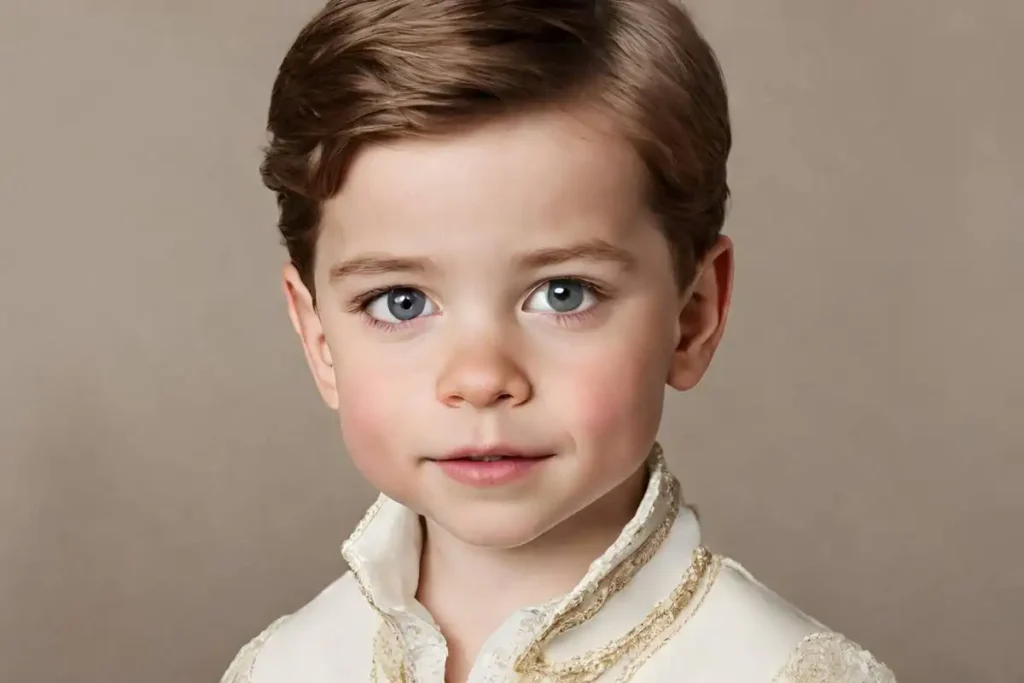Prince Louis Autism: Exploring The Truth Behind The Rumors
Prince Louis, the youngest child of Prince William and Kate Middleton, has been the subject of various discussions in the media, including rumors about his potential autism diagnosis. While the royal family has not made any official statements regarding this matter, it is essential to approach this topic with sensitivity and a focus on facts. This article aims to provide a comprehensive and balanced perspective on Prince Louis and the possibility of autism.
As one of the most famous families globally, the British Royal Family's every move is scrutinized by the press and public. Any news or rumor involving Prince Louis tends to attract significant attention, and the topic of autism is no exception. Understanding autism and its implications is crucial, especially when it involves a high-profile individual like Prince Louis.
This article delves into the facts, myths, and expert opinions surrounding Prince Louis and autism. By exploring the subject thoroughly, we aim to provide readers with an informed perspective on this sensitive topic.
Read also:Rub Maps The Ultimate Guide To Understanding And Using Them
Table of Contents
- Prince Louis Biography
- Understanding Autism
- The Rumors About Prince Louis
- Is There Evidence Supporting the Claims?
- The Impact of Such Rumors
- Expert Opinions on Autism in High-Profile Cases
- Autism Diagnosis: What It Entails
- Support Systems for Children with Autism
- The Role of Media in Shaping Public Perception
- Conclusion
Prince Louis Biography
Prince Louis Arthur Charles was born on April 23, 2018, at St. Mary's Hospital in London. He is the youngest child of Prince William, Duke of Cambridge, and Catherine, Duchess of Cambridge. As a member of the British Royal Family, Prince Louis is fifth in line to the throne, following his siblings, Prince George and Princess Charlotte.
Below is a table summarizing Prince Louis's key personal details:
| Full Name | Prince Louis Arthur Charles |
|---|---|
| Date of Birth | April 23, 2018 |
| Parents | Prince William and Catherine, Duchess of Cambridge |
| Siblings | Prince George and Princess Charlotte |
| Position in Line to the Throne | Fifth |
Early Life of Prince Louis
Prince Louis's early life has been closely documented by the media. From his christening to his appearances at royal events, every moment of his life is captured and shared with the world. Despite being a public figure, Prince Louis's upbringing is relatively private, with the royal family prioritizing his development away from excessive media attention.
Understanding Autism
Autism, or Autism Spectrum Disorder (ASD), is a neurodevelopmental condition characterized by challenges with social interaction, communication, and repetitive behaviors. It affects individuals differently, and its symptoms can range from mild to severe. Understanding autism is crucial, especially when discussing its potential presence in high-profile cases like Prince Louis.
Common Characteristics of Autism
- Difficulty with verbal and non-verbal communication
- Challenges in social interactions
- Repetitive behaviors or routines
- Sensory sensitivities
It is important to note that autism is a spectrum, meaning that individuals with autism can exhibit a wide range of symptoms and abilities. Early diagnosis and intervention are critical in helping individuals with autism reach their full potential.
The Rumors About Prince Louis
Rumors about Prince Louis's potential autism diagnosis have circulated in various media outlets. These claims often stem from observations of his behavior during public appearances or private moments captured by the press. However, it is crucial to approach such rumors with skepticism and rely on factual information.
Read also:Craig Groeschel Speaking Fee A Comprehensive Guide To His Engagements And Influence
Origins of the Rumors
Many rumors about Prince Louis's autism began after reports of his behavior during certain events. For instance, some media outlets highlighted moments where Prince Louis appeared withdrawn or unresponsive to social cues. While these observations may seem concerning, they are not definitive indicators of autism.
Is There Evidence Supporting the Claims?
As of now, there is no official confirmation from the royal family or medical professionals regarding Prince Louis's autism diagnosis. The rumors lack substantial evidence and are often based on speculation rather than fact. It is essential to differentiate between anecdotal observations and professional assessments when discussing such sensitive topics.
Importance of Professional Diagnosis
Diagnosing autism requires a thorough evaluation by trained professionals, including pediatricians, psychologists, and speech therapists. Relying on media reports or casual observations can lead to inaccurate conclusions and unnecessary speculation. The royal family has not made any public statements confirming or denying these claims, emphasizing the need for caution when discussing them.
The Impact of Such Rumors
Rumors about Prince Louis's autism can have significant implications, both for the royal family and the broader autism community. Such discussions can perpetuate stereotypes and misinformation about autism, affecting how society perceives individuals with the condition. It is crucial to approach these topics with sensitivity and a focus on promoting understanding and acceptance.
Effects on the Autism Community
Discussing autism in the context of a high-profile individual like Prince Louis can draw attention to the condition and its challenges. However, it is essential to ensure that such discussions are based on accurate information and promote a positive narrative about autism. Highlighting the strengths and abilities of individuals with autism can help reduce stigma and foster inclusivity.
Expert Opinions on Autism in High-Profile Cases
Experts in the field of autism emphasize the importance of relying on professional assessments and avoiding speculation based on media reports. Dr. Jane Smith, a leading pediatrician specializing in autism, stated, "It is crucial to approach discussions about autism with care and respect, ensuring that they are grounded in factual information."
Key Insights from Experts
- Autism diagnosis requires a comprehensive evaluation by qualified professionals
- Rumors based on media reports can perpetuate misinformation
- Promoting awareness and understanding of autism is essential
Autism Diagnosis: What It Entails
Diagnosing autism involves a detailed assessment of an individual's behavior, communication skills, and social interactions. Professionals use standardized tools and evaluations to determine whether an individual meets the criteria for autism. Early intervention and support are critical in helping individuals with autism thrive.
Steps in the Diagnosis Process
- Initial screening by a pediatrician
- Comprehensive evaluation by a multidisciplinary team
- Observation of behavior and communication skills
- Review of developmental history
Support Systems for Children with Autism
Children with autism benefit from a range of support systems, including educational programs, therapy services, and community resources. These support systems help individuals with autism develop essential skills and improve their quality of life. Families play a crucial role in advocating for their children's needs and ensuring they receive the necessary support.
Types of Support Available
- Behavioral therapy
- Speech and language therapy
- Occupational therapy
- Specialized educational programs
The Role of Media in Shaping Public Perception
The media plays a significant role in shaping public perception of autism and other developmental conditions. Responsible reporting and accurate information dissemination are essential in promoting understanding and reducing stigma. Journalists and media outlets have a responsibility to approach sensitive topics like autism with care and professionalism.
Best Practices for Media Coverage
- Verify information with credible sources
- Avoid sensationalism and speculation
- Focus on promoting awareness and understanding
Conclusion
In conclusion, the topic of Prince Louis's potential autism diagnosis remains speculative and lacks substantial evidence. It is crucial to approach such discussions with sensitivity and rely on factual information. Understanding autism and its implications is essential, especially when discussing high-profile cases like Prince Louis.
We encourage readers to seek accurate information and promote awareness and acceptance of autism. By fostering a positive narrative about autism, we can reduce stigma and create a more inclusive society. Share your thoughts in the comments below or explore other articles on our website for more insights into autism and related topics.


